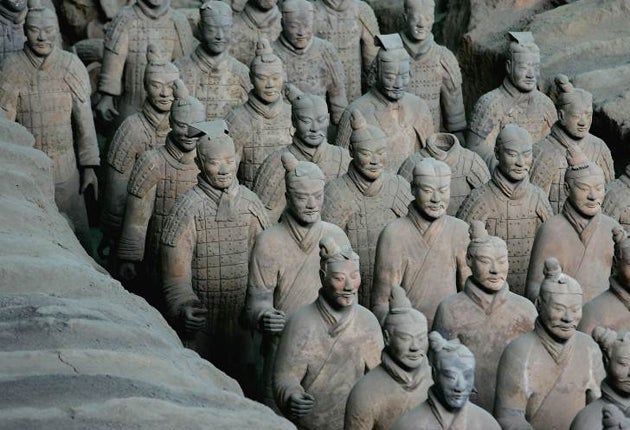Grave robbers arrested after raid on China's terracotta tomb

Nine people have been arrested in China after grave robbers targeted the tombs of the ancestors of the country's first Emperor, Qin Shi Huang, whose resting place is guarded by the famous Terracotta Army.
The intrusion was discovered on 8 October, when a routine patrol by guards from the Cultural Relics Bureau discovered traces of new earth on top of a mud seal that blocks the entrance to the tombs at the ancient capital of Xi'an, where China's earliest leaders are buried. The bureau keeps watch over the graves, which archaeologists lack the resources to excavate properly.
Hacksaws and mobile phone covers were also found nearby. Police were called after another patrol 12 days later found walkie-talkies near the entrance. They found a hole measuring 70 cm by 50 cm opening into a 36-metre-long tunnel in which had been left disposable gloves, ropes and plastic pipes, apparently used as rudimentary breathing apparatus.
Video cameras lowered into the hole revealed the coffins of the ancient Chinese royals had been smashed open. The nine suspects arrested by police confessed to using dynamite to blast the tunnel into the tomb. They said they encountered evidence that it had been looted in the past and were concerned the roof would collapse. Only when their boss raised their wages did they agree to continue.
The grave robbers were so well-equipped they had laid electricity cables along the tunnel and installed fans to pump air into the tomb. Local newspapers said a single relic had been recovered, but gave no details. Other reports said nothing had been found.
The suspects denied taking anything from the tomb where King Zhuangxiang and Lady Zhao, his concubine, are believed to have been buried. News of the robbery at such a major tomb was deemed so serious that there was a ban on any reporting while officials carried out their investigations.
Zhuangxiang ruled one of many small states and died in 246BC at the age of 35 after a three-year reign. His son became king of the state of Qin at the age of just 13 and was the instrumental figure in uniting the warring tribes into a single kingdom. It is Qin from which the name China derives. The incident has led to calls for the graves to be officially excavated, removing the temptation for grave robbers. In the past several years treasures have been stolen from ancient burial sites that are poorly guarded. The theft has also intensified calls for the group of tombs, discovered in 1986 and covering 24 square kilometres, to be resealed.
Nearby, the mausoleum of the first Emperor Qin Shi Huangdi lies untouched, surrounded by the famous Terracotta Army, dating from 210 BC. Even here the majority of the estimated 8,000 6ft statues remain buried. Discovered by accident in 1974, they have become one of the most popular tourist sights in China.
Join our commenting forum
Join thought-provoking conversations, follow other Independent readers and see their replies
Comments
Bookmark popover
Removed from bookmarks